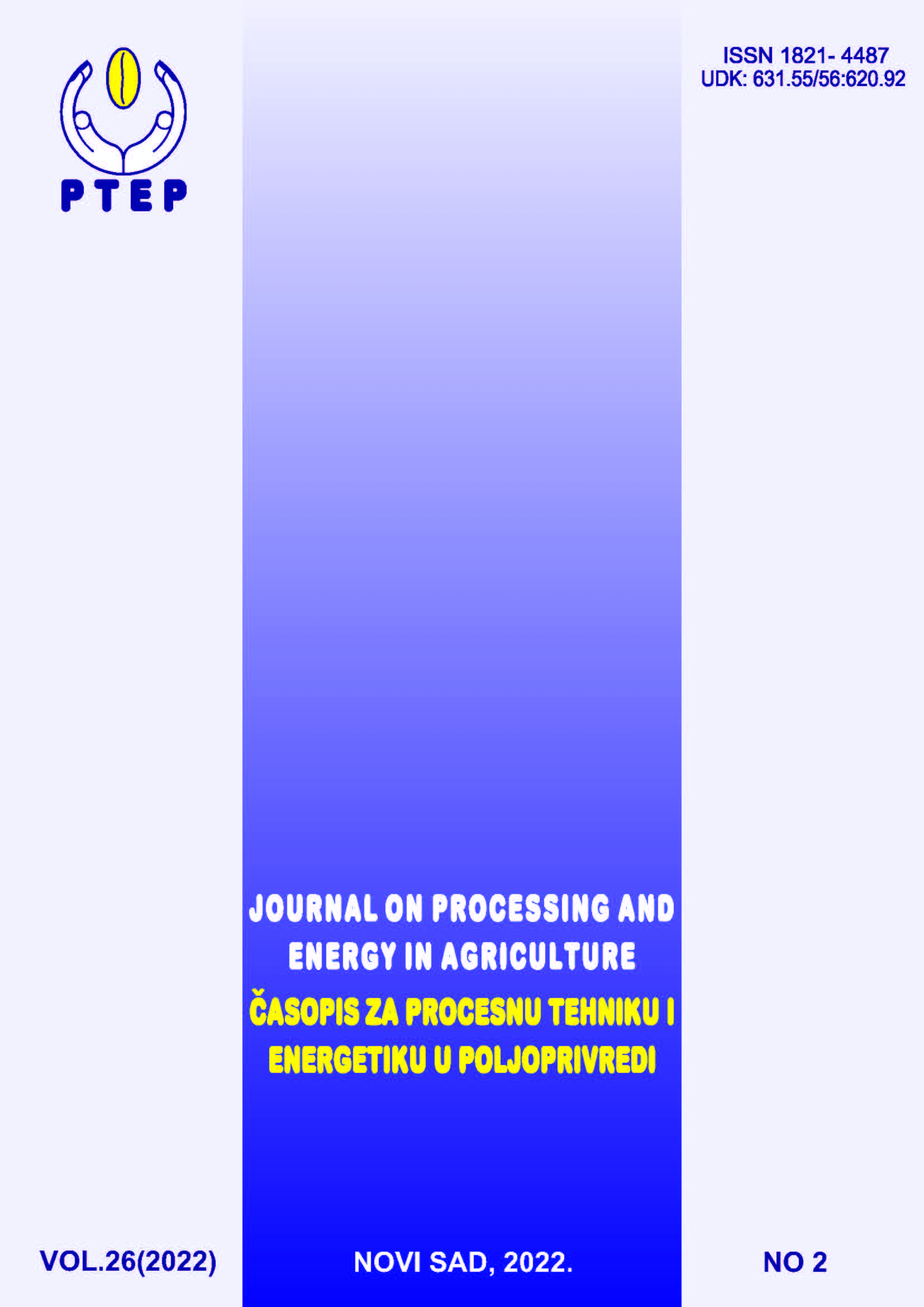The DETERMINATION OF THE RHEOLOGICAL CHARACTERISTICS OF SOME VARIETIES OF NEW RICE FOR AFRICA (NERICA) RELEVANT TO ITS PROCESSING
DETERMINATION OF THE RHEOLOGICAL CHARACTERISTICS OF SOME VARIETIES OF NEW RICE FOR AFRICA (NERICA) RELEVANT TO ITS PROCESSING
Sažetak
The pasting properties of some NERICA (New Rice for Africa) varieties were determined using the rapid visco-analytical machine (RVA). The studied varieties include FARO 44, FARO 52, FARO 57, FARO 60, and FARO 61. The parameters assessed includes the pasting temperature, peak time, peak or maximum viscosity, hot paste viscosity or trough, cold paste or final viscosity, the breakdown, and the setback. Results obtained indicated that the pasting characteristics of NERICA varieties studied exhibited good pasting behavior. Results showed that peak viscosity, final viscosity, hot paste viscosity, breakdown, and setback ranged from 30.83 to 85.17 RVU; 62.21 to 167.13 RVU; 25.83 to 76.88 RVU; and 5.01 to 8.29 RVU; and 31.38 to 81.96 RVU respectively. There were significant effects of moisture content and temperature (p < 0.05) on all parameters studied. These generated results of the pasting characteristics of NERICA will be very useful in determining their suitability in food and other relevant industries.
Reference
A.O.A.C. (2005). Association of Official Agricultural Chemists. Approved methods of the AOAC (18th ed).
Adegunwa, M. O., Bakare, H. A., Alamu, E. O. and Abiodun, O.K. (2012). Processing Effects on Chemical, Functional and Pasting Properties of Cowpea Flour from Different Varieties. NIFOJ, 30(1); Pp: 67 – 73.
Adeyemi, I. A., and Idowu, M.A. (1990). Evaluation of pregelatinized maize flour in the Development of “Maisa” – A baked product. Nig. Food Journal, 18; Pp: 63 – 73.
Appelqvist, I. A. M. and Debet, M. R. M. (1997). Starch-biopolymer interactions – A review. Food Rev. Int. 13 (2); PP: 163-224.
Eze, P.C., Oluka, S.I. and Eze, C.N. (2020). Effects of Moisture Content and Loading Positions on the Mechanical Properties of New Rice for Africa (NERICA). Scientific Journal of Agricultural Engineering (SJAE), Vol. 1 (2020); Pp: 38 – 50.
Gayin, J., Manful, J.T. and Johnson, P-N.T. (2009). Rheological and sensory properties of rice varieties from Improvement Programme in Ghana. International Food Research Journal, 16;Pp: 167-174
Ituen, E.U.U., and Ukpakha, A.C. (2011). Improved method of par-boiling paddy for better quality rice. World Journal of Applied Science and Technology, 3 (1); Pp: 31 – 40.
Iwe, M.O. Onyeukwu, U., and Agiriga, A.N. (2016). Proximate, functional and pasting properties of FARO 44 rice, African yam bean and brown cowpea seeds composite flour. Cogent Food & Agriculture, 2; ID: 1142409.
Michiyo, W., Tomoko, M., Kikuchi, T., Hiroshi, K., and Naofumi, M. (2004). Application of pre-germinated brown rice for breadmaking. Cereal chem. 81 (4); Pp: 450-455.
Mlakar, S.G., Bavec, M., Turinek, M. and Bavec, F. (2009). Rheological properties of Dough made from Grain Amaranth –Cereal Composite Flours Based on Wheat and Spelt. Czech J. Food Sci., 27 (5); Pp: 309-319.
Odejobi, O.J., Ige, M.M., and Adeniyi, K.A. (2014). Pasting, Thermal and Gel Texture Properties of Three Varieties of Nigeria Rice Flours and Starches. British Journal of Applied Science & Technology, 4 (30); Pp: 4304-4315.
Patindol, J. Wang, Y., and Jane, J. (2005). Structure – Functionality Changes in Starch following Rough Rice storage. Starch/starke, 57; Pp: 197-207.
Rao, M.A., S.H. Rizvi, S.H. and Datta, A.K. (2005). Engineering properties of foods. Third edition, CRC Press, Taylor & Francis Group, 6000 Broken Sound Parkway NW, USA.
Rather, T. A., Malik, M.A. and Dar, A.H. (2016). Physical, milling, cooking, and pasting characteristics of different rice varieties grown in the valley of Kashmir India. Cogent Food & Agriculture, 2; ID: 1178694.
Sahin, S. and Sumnu, S.G. (2006). Physical properties of foods. Springer Science Business Media, LLC., 233 Spring Street, New York, NY 10013, USA.
Shafie, B., Cheng, S. C., Lee, H.H. and Yiu, P.H. (2016). Characterization and classification of whole-grain rice based on rapid visco analyzer (RVA) pasting profile. International Food Research Journal, 23(5); Pp: 2138-2143.
Steffe, J.F. (1996). Rheological Methods in food process engineering; Second edition. Freeman press, East Lansing, USA.
Tabilo-Munizaga, G. and Barbosa-Canovas, G.V. (2005). Rheology for the food industry. Journal of food Engineering, 67; Pp: 147-156.
Udemezue, J.C. (2018). Analysis of rice and consumption trends in Nigeria. Journal of plant science and crop protection, 1(3); Pp: 1-6.
Wani, A.A., Singh, P., Shah, M.A., Schweiggert-Weisz, U., Gui, K. and Wani, I.A. (2012). Rice Starch Diversity: Effects on Structural, Morphological, Thermal, and Physicochemical properties- A review. Comprehensive Reviews in Food Science and Food Safety, 11: PP; 417-436.
WARDA, (2008). West Africa Rice Center/FAO/SAA, Issues on NERICA; the New Rice for Africa, a Compendium. E.A. Samado, R.G. Guei and S.O. Keya (eds., Cotonou, Benin, Africa Rice Center (WARDA); Roma, Italy; FAO; Tokyo, Japan. Sasakwa Africa Association; Pp: 210.

